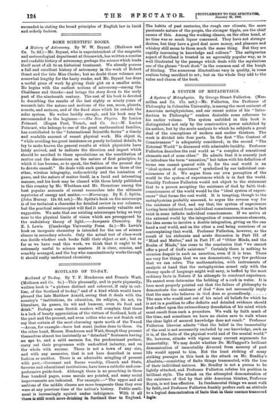SCOTLAND OF TO-DAY.
Scotland of To-day. By T. F. Henderson and Francis Watt. (Methuen and Co. 6s.)—This pleasantly, and in parts piquantly, written book is "a picture distinct and coherent, if only in out- line, of the Scotland of to-day," and of a kind which would have pleased the late Matthew Arnold, seeing that it deals with the country's "institutions, its education, its religion, its art, its literature, its games, its wit and humour, even its food and drink." Perhaps some Scotch readers will complain that there is a lack of hearty appreciation of the virtues of Scotland, both of -the past and the present, and even critics who are not Scotch will ' say that certain of the most charming spots north of the Tweed —Arran, for example—have but scant justice done to them. On the other hand, Messrs. Henderson and Watt, though they present -themselves almost too insistently as "detached" Scotsmen having an eye to, and a mild sarcasm for, the predominant partner, .carry out their programme with undoubted industry, and on the whole with success. There is not a town of any size, and with any memories, that is not here described in some fashion or another. There is an admirable mingling of present with past,—Covenant and Burns worship, Church and State, :taverns and educational institutions, have here a catholic and com- prehensive guide-book. Although there is no preaching in these four hundred pages, some morals are pointed, and many social improvements are indicated. For example :—" The upper and all sections of the middle classes are more temperate than they ever were at any previous time of the nation's history. Public senti- ment is -increasingly against undue indulgence. With it all -there is still much more drinking in Scotland thar in England. The habits of past centuries, the rough raw climate, the more passionate nature of the people, the stronger tipple, are the chief causes of this. Among the working classes, on the other hand, at no time was so much liquor consumed. They have not strbnger desires, but they have a good deal more money, and pleasure And whiskey still mean to them much the same thing. But they are rapidly increasing in knowledge and culture." The antiquarian aspect of Scotland is treated in an agreeably popular way, as is well illustrated by the passage which deals with the mysterious use of the phrase " bruti Scoii" in the common seal of the burgh of Stirling. The numerous illustrations vary in quality, in some realism being sacrificed to art; but on the whole they add to the value and charm of the book.




















































 Previous page
Previous page